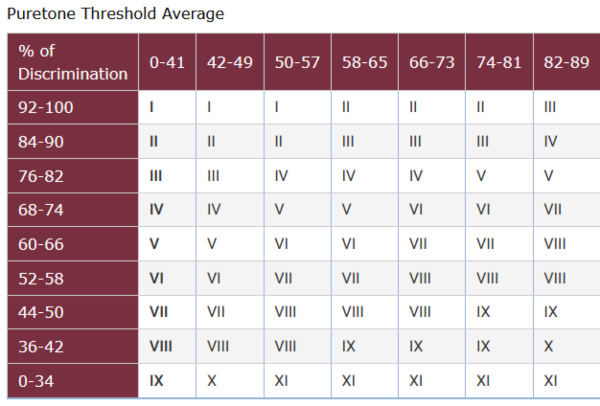Hearing loss is relatively common both in the civilian world and military life.
Unfortunately, soldiers risk even more as many service members generally operate around incredibly loud, damaging sounds.
For this reason, many veterans seek to receive VA disability for hearing loss.
What do you need to know about hearing loss and how to file a disability claim with the VA?
Continue reading to learn more about receiving compensation for damaged hearing.
Related Article – 10 Benefits Of Being A Military Wife (and 5 not-so good things)
What is Hearing Loss?

Hearing loss is fairly common in adults as they age.
According to the Mayo Clinic, approximately one-third of people in the United States between the ages of 65 – 75 have some degree of hearing loss.
Furthermore, nearly 1 in 2 adults past the age of 75 have permanent hearing loss.
Hearing loss is divided into three different types:
- Conductive (Outer or Middle Ear)
- Sensorineural (Inner Ear)
- Mixed (Combination)
Mixed hearing loss is a combination of conductive hearing loss and sensorineural hearing loss.
Therefore, it involves hearing damage in the outer, middle, and inner ear.
Military personnel confronts additional dangers and concerns when it comes to hearing loss.
Service members generally perform job functions around loud machinery or explosions.
The repeated exposure to these types of loud sounds pays a price on your hearing as it slowly deteriorates over time.
Most types of hearing loss are irreversible which is why taking care of your ears and exposure to loud noise from an early age is so important.
Unfortunately, veterans often notice their hearing deteriorate at a much faster rate compared to the civilian population because of their job demands.
As a result, seeking VA compensation through a disability claim is often the best means of getting relief.
Symptoms of Hearing Loss
Chronic exposure to loud noises and aging both contribute to hearing loss which is common in most adults 65 or older.
There are other factors that can contribute to temporary hearing loss such as excessive earwax.
If you are having problems with your ears and hearing, you should schedule an appointment with a medical professional or ear specialist.
There are several signs and symptoms attributed to hearing loss:
- Muffling of speech/sounds
- Difficulty understanding words
- Trouble hearing consonants
- Frequently asking others to speak louder or more slowly.
- Needing to turn the volume up high on electronic devices.
Hearing loss is detrimental enough that it can cause victims to want to withdraw from social settings and conversations to avoid the inconvenience.
As a result, hearing loss can start to negatively alter other functions of your lifestyle which makes finding treatment important.
Once again, you should speak with a medical professional if you are having issues with your hearing.
Causes of Hearing Loss
The ear consists of three major areas (outer ear, middle ear, and inner ear).
When sound waves pass through the outer ear it causes vibrations which are amplified as they travel through the inner ear.
The nerve cells in your ears contain thousands of tiny hairs that help translate sound vibrations into electrical signals.
Then, these electrical signals are transmitted to your brain where it processes the signals into sound.
Hearing loss generally occurs when the ears are exposed to loud machinery or explosions over a long duration of time.
Additionally, the inevitable factor of age slowly erodes away at our hearing like other senses in the body.
Hearing loss can begin for a number of reasons yet is often attributed to damage in one or more parts of the ear.
Moreover, it can be the result of an ear infection, abnormal bone growths, ruptured eardrum, or tumors.
In the best-case scenario, removing excess earwax can sometimes remedy the problem if the damage isn’t permanent.
Unfortunately, most service members are unable to avoid long-term exposure to loud noises because of the occupation.
With that said, you can take precautions by using hearing protection.
Related Article: Does The National Guard Pay For College?
Hearing Loss VA Ratings Schedule for 2020

Hearing loss is a significant problem for veterans of the military.
According to the VA, more than 2.7 million veterans currently receiving disability for hearing loss or tinnitus.
However, most medical experts argue the number is even higher as not every veteran is aware of their hearing problems or have sought compensation for the disability.
Regardless of the specific number of veterans receiving disability benefits for hearing loss, the problem is prevalent in the U.S. Armed Forces.
The Centers for Disease Control and Prevention (CDC) found that veterans are 30% more likely compared to civilians to have severe hearing impairment.
Additionally, those that served after September 11 are 4x more likely to have hearing loss compared to civilian counterparts.
The bottom line is hearing loss is a bigger dilemma for veterans compared to most individuals that have worked in the civilian world.
Hearing loss can significantly alter your life, negatively impacting your quality of life and daily functioning.
For this reason, the VA currently offers disability benefits to veterans with hearing loss.
The VA rates hearing loss through federal code 38 CFR 4.85 – Evaluation of Hearing Impairment.
The VA ratings are designed to examine each patient on a case by case basis for hearing impairment.
A rating is assigned to the patient based on age and the degree of hearing damage.
The higher percentage the patient receives, the higher likelihood of receiving approval for a disability claim and therefore more compensation.
Consequently, veterans must receive a hearing loss diagnosis from a medical professional to begin the process of seeking VA disability benefits.
How Does the VA Qualify Eligibility for Hearing Loss?
Hearing issues are very common in the United States, especially among older adults.
Tragically, retirees and veterans of the U.S. Armed Forces traditionally start dealing with hearing loss at a far younger age compared to civilians.
In fact, the VA recently described hearing problems like tinnitus as “the most prevalent service-connected disability among American Veterans”.
The goal of any VA disability claim is to link the medical condition with a service connection.
In other words, the patient struggling with hearing loss must prove to the VA that the medical condition started or worsen during their time in service in order to receive disability benefits.
Otherwise, the military is not considered at fault for your injuries and therefore you may not receive any form of VA disability.
While VA rating percentages are subject to change, here are some current examples of how you may qualify for VA disability coverage:
- Otosclerosis (Dependent on the amount of hearing loss)
- Chronic Suppurative Otitis Media (10%)
- Chronic Otitis Externa (10%)
- Recurrent Tinnitus (10%)
- Peripheral Vestibular Disorders (10 – 30%)
- Loss of Ear(s) (10 – 50%)
- Meniere’s Syndrome (30 – 100%)
- Malignant Neoplasm (100%)
Sadly, the U.S. Armed Forces currently do not currently observe Tympanic Membrane Perforation, or a perforated ear, as a hearing impairment.
As a result, patients receive a 0% rating for this medical condition.
Related Article – Does Sleep Apnea Qualify As A VA Disability?
How to file a VA claim for hearing loss?

It is vital to do your homework when you start preparing a VA disability claim.
Thankfully, the VA recognizes hearing impairment as a significant issue in the U.S. Armed Forces and usually attempts to work with veterans toward receiving disability benefits.
However, you will still need to follow a complicated process to state your case:
Step 1: Schedule an examination for hearing impairment with a state-licensed audiologist.
Step 2: Make sure that the hearing examination also includes a controlled speech discrimination test and puretone audiometry test. The examinations are conducted without the use of hearing aids.
Step 3: The VA uses Table VI, Numeric Designation of Hearing Impairment Based on Puretone Threshold Average and Speech Discrimination to determine a Roman numeral designation for your level of hearing impairment.
Step 4: The VA determines a percentage evaluation for hearing impairment by combining the Roman numeral designation for each ear based on test results.
Step 5: After hearing loss is determined through the examination, the veteran must link the hearing impairment to a service connection. In certain situations, patients may only be able to prove the hearing impairment is service-connected in only one ear.
Step 6: The VA concludes its medical evaluation and assigns a final VA disability rating. Based on the rating, the veteran may receive special monthly compensation for deafness or another hearing loss disability.
Related Article: 15 Best States For Military Retirees And Veterans
Frequently Asked Questions (FAQ)
Here are some frequently asked questions about VA disability for hearing loss:
What other benefits can I receive for hearing loss?
Service members are required to meet with a VA audiologist in order to diagnose a medical condition.
After a series of tests are conducted, the VA can help determine if you are entitled to disability benefits.
Veterans that suffer from hearing loss rely on monthly compensation to treat their condition.
Hearing aids and other hearing supported devices are often available to patients.
Furthermore, service animals have been successful in assisting veterans with a variety of medical conditions, including hearing loss.
However, you cannot receive any of these services until you get evaluated by a VA audiologist.
What is the average VA compensation for hearing loss?
According to Veterans United, the average veteran receives $435 per month at a 30% disability rating.
Meanwhile, the same veteran at a 50% disability rating would receive nearly $900 per month.
The VA determines your disability rating after a medical review of the condition and the compensation levels are subject to change.
Moreover, the compensation rates do change based on the number of dependents.
For example, a veteran claiming a spouse only will receive less in monthly disability compared to a veteran with a spouse and other dependents.
Contact a VA representative for more information on the claims process and potential disability payouts.
What is the maximum VA rating for hearing loss?
The maximum VA rating for hearing loss is 100%.
However, most medical conditions listed under hearing impairment do not qualify for full disability coverage.
The one major exception at the moment is Malignant Neoplasm which is a guaranteed 100% for 6 months following the end of treatment.
At that point in time, the 100% rating might change depending on VA review.
Moreover, veterans with Meniere’s Syndrome are entitled to a VA rating between 30 – 100%.
Those that have “attacks of vertigo and cerebellar gait” which occurs more than once per week are entitled to a 100% rating.

What percentage does the VA typically compensate for hearing loss?
While the U.S. Armed Forces recognizes hearing loss as one of its most prevalent service-connected medical conditions, the VA ratings are not stellar.
The typical disability ratings for hearing loss range from 0 – 10%.
In other words, the average disability rating will likely not cover the inconvenience and hassle of hearing impairment issues.
Nonetheless, additional services like hearing aids and service animals may supplement where monthly disability income is not sufficient.
Those that suffer from more severe types of hearing loss can receive a much higher VA rating than 0 – 10%.
It really depends on a case by case basis which is why you should schedule a hearing examination with a VA clinic as soon as possible.
What can I do if my hearing loss claim is denied?
It is not uncommon to receive a denial letter from the Department of Veterans Affairs (VA).
You should not be discouraged as there are other options for pursuing disability benefits.
For starters, veterans have the right to appeal a VA disability denial.
You will need to file a Notice of Disagreement (NOD) – VA Form 21-0958 with the VA.
Some veterans prefer to hire legal representation to help fight the appeal.
You can learn more about the VA disability appeals process by reading the VA’s article on it here.
Related Article – Military OneSource: Your Go-To Guide
Conclusion
Hearing loss is a noteworthy problem in the United States, especially among veterans.
The CDC and VA have both recognized that hearing impairment like tinnitus is becoming more significant in the military.
Consequently, you may be eligible to receive VA disability benefits for hearing loss.
First, you will need to schedule an examination with a hearing specialist that will perform a couple of different tests.
If hearing loss is determined, the next step is to prove the damage is service-connected and therefore you are entitled to disability benefits.
- Replacing Dog Tags: 6 Things You Need to Know - June 28, 2024
- Navy OAR Test Study Guide - June 24, 2024
- 10 Best Sniper Movies of all Time - June 20, 2024
Originally posted on December 2, 2020 @ 5:10 pm
Affiliate Disclosure: This post may contain affiliate links. If you click and purchase, I may receive a small commission at no extra cost to you. I only recommend products I have personally vetted. Learn more.


I am a veteran who served in Vietnam (1965/66). I was a machine gunner and had numerous contacts with enemy fire. I was exposed to mortar attacks. I am rated at 20%; however, I suffer from sensorineural hearing loss which shows levels as deep as severe to profound. The speech and pretone test is done with a sound-captive earphone, but I hear very few words clearly at a distance of two feet or more. Could the VA be discriminating against people who have conductive loss as opposed to people who hear sounds but have have trouble hearing where sounds come from and hearing words that are very difficult to clearly understand? Even with hearing aids, I still have difficulty understanding softly spoken words.